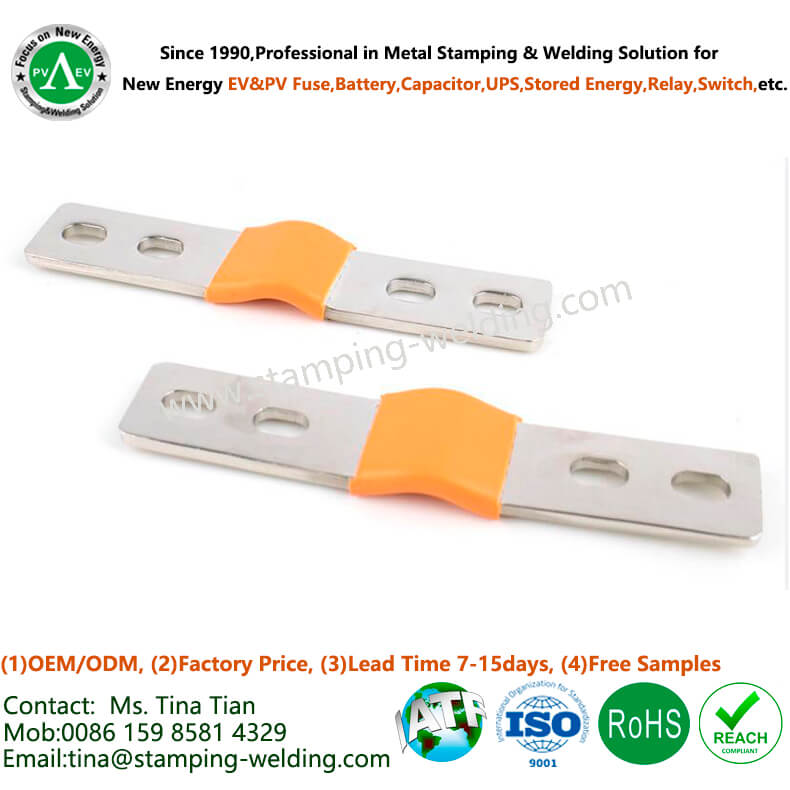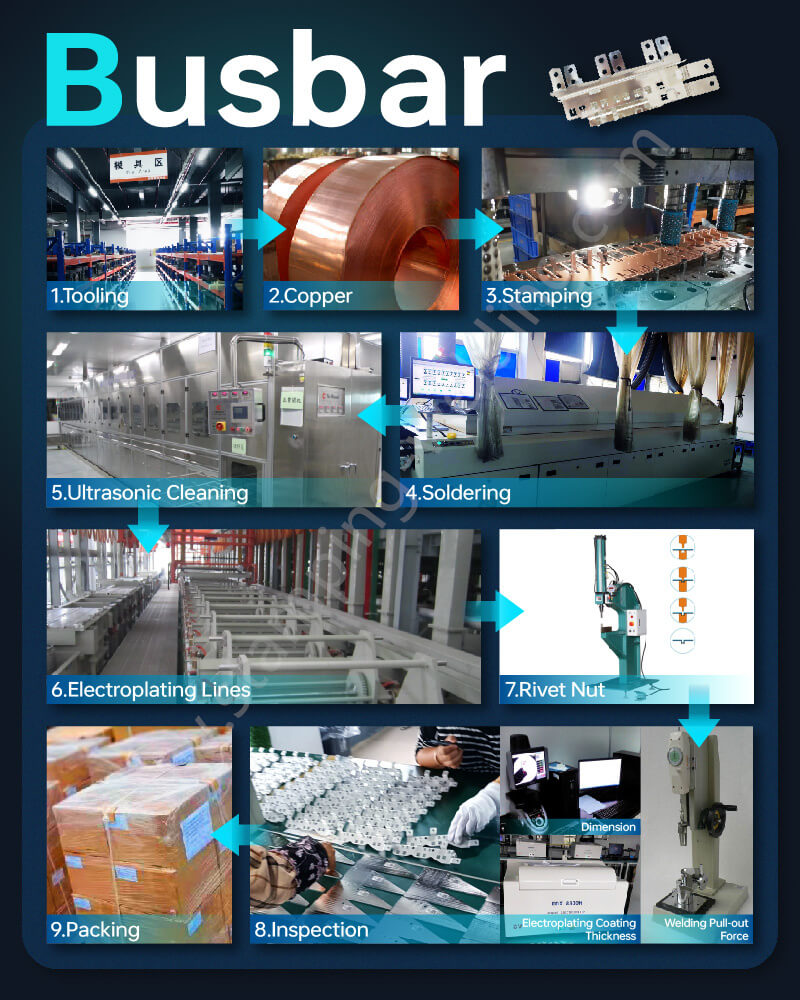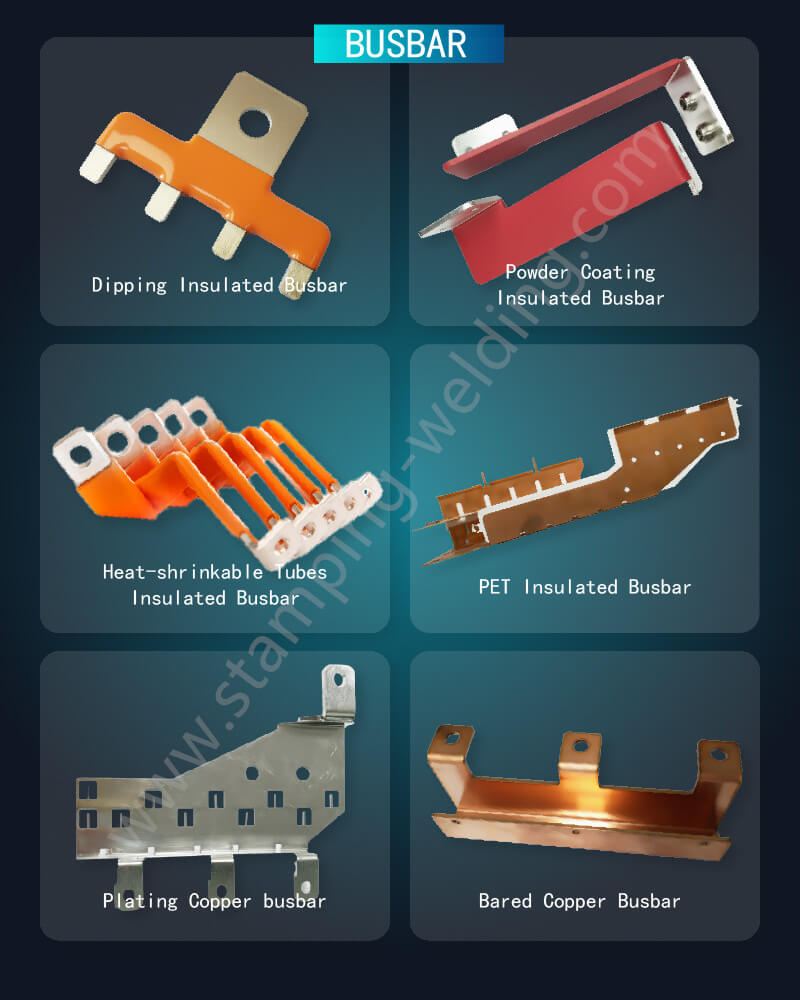

2- Base Material Standard:
GB : T2Y2 Copper
DIN: E-Cu58 (Number: 2.0065)
EN: Cu-ETP ( Number: CW004A)
ISO: Cu-ETP
UNS: C11000
JIS: C1100
BS: C101
Purity ≥99.99% Copper, Conductivity %IACS≥97, Hardness 80~110HV, Tensile Strength 245-345MPa, other material also can be customized.
3-Surface Treatments:
(3.1) Silver plating
(3.2) Tin plating
(3.3) Nickel plating
(3.4) Ultrasonic cleaning
Normally plated thickness is 3μm to 12μm, but all upon customers' request.
4- Insulation Options:
(4.1) PET insulation paper (brands USA GTS, GERMANY KREMPEL, etc with white or milky white colors)
(4.2) PVC dipping (orange and green are the most popular colors)
(4.3) Epoxy powder coating (orange, green and grey are the most popular colors)
(4.4) PE heat shrink tube (orange, green, black, red are yellow are the most popular colors)
Flame Retardant / Fire Resistance: UL94-V-0 or upon you request;
Operating Temperature: -45ºC to +150 ºC
5- Copper Busbar Resistance: ≤0.00001Ω
6- Copper Busbar load voltage 3500VDC to 5000VDC and current 100A to 2000A
7- Copper Busbar Assembly Fixtures: USA PEM stainless nuts, studs, standoffs, screws, etc
8- Free Samples:1-10pcs is allowed
9- Lead Time:Orders 7-10days,Samples 10-20days(including the tooling/die production of Copper Stamped Part);
10- Packing: pearl cotton/blister box inside and carton/pallet outside
11- Certifications: ISO9001, IATF16949, RoHS, REACH, etc.
12- Production Capacity: 50,000,000 pcs/month
13- Applications: film capacitors for new energy electric vehicles and hybrid vehicles, new energy vehicle battery packs, new energy photovoltaic energy storage, power appliances, distribution cabinets, rail transit, cloud server uninterruptible power supplies and other power systems.
The use of PVC (Polyvinyl Chloride) dipping for insulating busbars in electric vehicle (EV) battery packs is a common practice to enhance electrical safety and protect against environmental factors. Here's an overview of the technology involved in PVC dipping for insulated busbars used in EV packs:
1. Purpose:
The primary purpose of PVC dipping is to provide insulation and protection to the busbars within the EV battery pack. This is crucial for preventing electrical shorts, ensuring safety, and maintaining the integrity of the electrical connections.
2. Material Selection:
Busbar Material: The busbars are typically made of highly conductive materials like copper or aluminum.
PVC Insulation: PVC is chosen as the insulation material due to its electrical insulating properties, flexibility, and resistance to environmental factors.
3. Cleaning and Surface Preparation:
The busbars undergo a cleaning process to remove any contaminants or impurities from the surface. This ensures proper adhesion of the PVC coating.
4. PVC Dipping Process:
Dipping: The cleaned busbars are immersed or dipped into a PVC solution or bath. This process coats the busbars with a layer of PVC, providing electrical insulation and protection against moisture, chemicals, and other environmental elements.
5. Thickness Control:
Manufacturers carefully control the thickness of the PVC coating to meet specific insulation requirements. The thickness is crucial for achieving the desired level of electrical insulation and protective properties.
6. Curing and Setting:
After the PVC coating is applied, the busbars may undergo a curing process. This involves setting the PVC through heat or other methods to ensure proper adhesion and durability of the insulation layer.
7. Quality Control:
The PVC-dipped busbars undergo thorough quality control checks. This includes inspections to verify the uniformity of the coating, absence of defects, and compliance with industry standards.
8. Integration into EV Battery Pack:
The insulated busbars are integrated into the EV battery pack, connecting individual cells and modules. The PVC insulation ensures that the electrical connections are protected from external influences and contribute to the overall safety of the battery pack.
9. Environmental Resistance:
The PVC insulation provides resistance against environmental factors such as moisture, chemicals, and temperature variations. This is crucial for the long-term reliability and performance of the EV battery pack, especially considering the demanding conditions in automotive applications.
10. Compliance with Safety Standards:
Manufacturers adhere to safety standards and regulations related to electrical components in EVs. Compliance ensures that the PVC-dipped insulated busbars meet the necessary safety and performance requirements.
PVC dipping for insulated busbars in EV battery packs is an established technology that strikes a balance between electrical performance, safety, and environmental resistance. It contributes to the overall reliability and safety of the electric vehicle's power system.


Contact Information:
Ms.Tina Tian (Sales Manager&Technology Engineer)
Xiamen Apollo Stamping Welding Technology Co., Ltd
Apollo Electronic Components (Xiamen) Co.,Ltd
Add: No.2, Chengyi North Road, Jimei Software Park, Jimei District, Xiamen City, Fujian Province, China, 361022
Mob/WhatsApp/WeChat: 0086-15985814329
Email: tina@stamping-welding.com
Web: www.stamping-welding.com , www.china-electronic-components.com
Since 2010, professional in Metal Stamping & Welding Solutions for New Energy EV & PV Fuse, Battery, Capactior, Relay, Switch, ect!